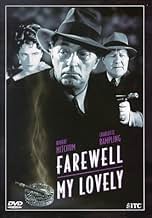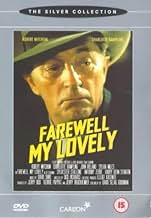When Dick Powell did his version of this Raymond Chandler classic Philip Marlowe story, he and RKO were laboring under the handicap of the motion picture code. Certain things like prostitution and homosexuality were simply not talked about in those times. Still with the changes that had to be made in the plot a really great version was done and it changed the career of Dick Powell forever.
Now back in those days, Robert Mitchum was getting started and would soon be doing many a noir film for RKO himself. In getting him for this version under the original title of Farewell My Lovely the producers certainly got themselves someone with whom the Philip Marlowe character fit like a glove.
Even with color, this version is remarkably evocative of the Forties style noir film. Charlotte Rampling steps nicely into the well trod path of people like Lauren Bacall and Lizabeth Scott.
For those who don't know the barebones of the story, Philip Marlowe is hired to find Velma Valento by her old gangster boy friend, a giant of a man named Moose Malloy who just finished doing a stretch in prison. Later on a man named Lindsay Marriott hires him to as a bodyguard and he's killed. The two cases are related and the how and why is what moves the plot.
John Ireland another forties veteran of many a noir film plays police lieutenant Nulty and my favorite in the film is Sylvia Miles who is the luckless dipsomaniacal Mrs. Florian.
I do marvel when I see this film at how well the spirit of the forties was captured in this film. Turn off the color on your set and its just like watching a great noir flick from that decade.



































